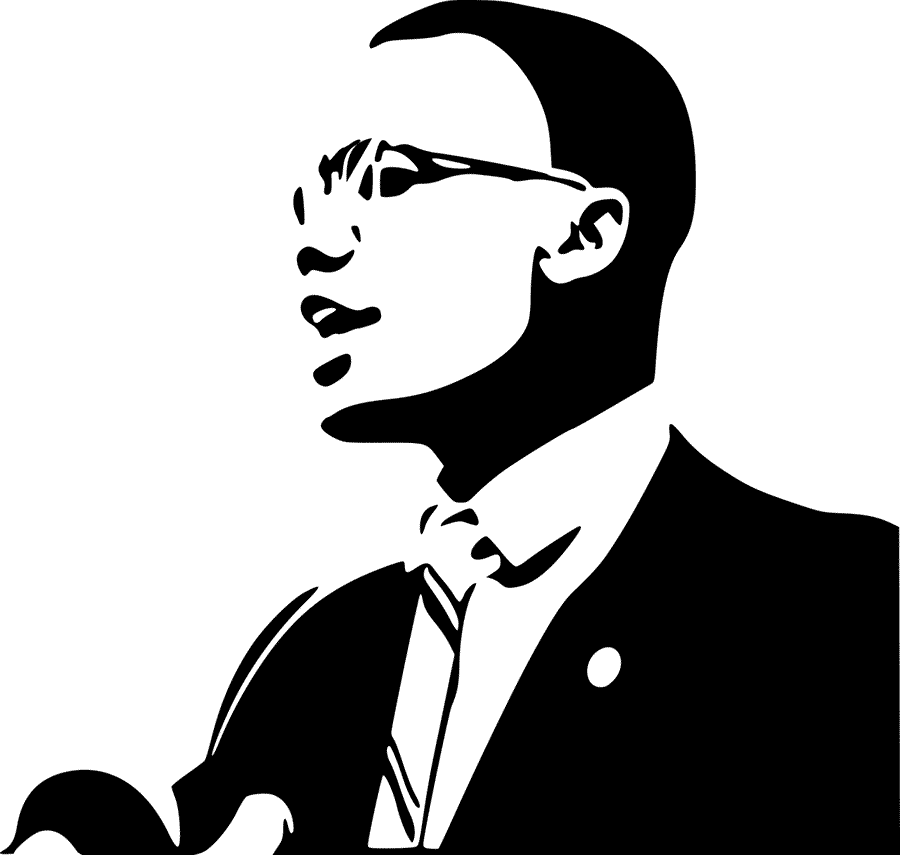Reading Comprehension About Malcolm X

Develop your reading skills. Read the following text about Malcolm X’s biography and do the comprehension task.
The Enduring Legacy of Malcolm X: A Journey of Transformation and Advocacy
Malcolm X, a towering figure in African American history, continues to captivate minds and inspire hearts with his remarkable journey of resilience, transformation, and unyielding advocacy. Born Malcolm Little on May 19, 1925, in Omaha, Nebraska, he would later adopt the name El-Hajj Malik El-Shabazz upon his conversion to Islam. From his turbulent childhood marked by tragedy and adversity to his emergence as a fearless leader in the struggle for civil rights, Malcolm X’s life story is a testament to the power of resilience and the quest for justice.
Malcolm’s early years were fraught with hardship and loss. The premature death of his father, Earl Little, under mysterious circumstances, cast a shadow over his formative years. Many believe Earl’s death to be the result of racial violence, a tragic reality that would haunt Malcolm throughout his life. The lynching of at least one of his uncles further underscored the pervasive racism and violence that plagued African American communities in the early 20th century.
At the tender age of six, Malcolm’s family faced another devastating blow when their home was set ablaze by white supremacists. This traumatic event not only claimed their residence but also shattered any semblance of security and stability. Struggling to make ends meet, Malcolm’s mother, Louise Little, worked tirelessly to provide for her children. However, her efforts were tragically cut short when she was institutionalized for mental health issues, leaving Malcolm and his siblings to navigate the harsh realities of life on their own.
The absence of parental guidance and the specter of poverty propelled Malcolm into a downward spiral, culminating in his involvement in criminal activities as a teenager. At the age of twenty, he was arrested for burglary and sentenced to prison, where he would spend the next six years of his life. It was within the confines of prison walls that Malcolm underwent a profound transformation—one that would alter the course of his life and the trajectory of the civil rights movement.
Embracing the teachings of the Nation of Islam, Malcolm found solace and purpose in the teachings of Elijah Muhammad. The Nation’s message of self-reliance, black empowerment, and separatism resonated deeply with Malcolm, providing him with a newfound sense of identity and belonging. Through rigorous study and introspection, Malcolm emerged from prison a changed man, determined to dedicate his life to the upliftment of his people and the pursuit of justice.
Upon his release from prison in 1952, Malcolm wasted no time in immersing himself in the Nation of Islam’s activities, quickly rising through the ranks to become one of its most prominent leaders. His impassioned speeches and uncompromising stance against white supremacy earned him a devoted following among African Americans disillusioned with the slow progress of the civil rights movement.
However, Malcolm’s tenure within the Nation of Islam was not without controversy. His outspoken criticism of mainstream civil rights leaders, coupled with his advocacy for black separatism and self-defense, drew ire from both white supremacists and more moderate voices within the African American community. Accusations of racism, black supremacy, and antisemitism dogged Malcolm throughout his career, tarnishing his reputation and complicating his relationships with allies and adversaries alike.
Yet, despite the challenges and setbacks he faced, Malcolm remained steadfast in his commitment to the struggle for racial equality and liberation. In March 1964, disillusioned by revelations of Elijah Muhammad’s moral indiscretions and increasingly at odds with the Nation of Islam’s leadership, Malcolm made the difficult decision to break ties with the organization. This pivotal moment marked a turning point in his life, setting him on a new path of spiritual and ideological exploration.
Renouncing his earlier beliefs in black separatism, Malcolm embraced Sunni Islam and embarked on a pilgrimage to Mecca, where he experienced a profound spiritual awakening. Witnessing people of all races and backgrounds worshipping together in harmony shattered his preconceived notions of racial superiority and division. This transformative experience inspired Malcolm to broaden his advocacy beyond the confines of racial identity, embracing a more inclusive vision of justice and solidarity.
Upon his return to the United States, Malcolm founded Muslim Mosque, Inc. and the Organization of Afro-American Unity, organizations dedicated to promoting black empowerment and self-determination. His evolving ideology, which now emphasized cooperation with mainstream civil rights leaders and a commitment to nonviolent resistance, garnered him newfound respect and admiration from allies and adversaries alike.
Tragically, Malcolm’s journey was cut short on February 21, 1965, when he was assassinated by three members of the Nation of Islam during a speaking engagement in New York City. His untimely death robbed the world of one of its most powerful voices for justice and equality, but his legacy endures as a beacon of hope and inspiration for generations to come.
Malcolm X’s life and legacy serve as a testament to the enduring power of courage, resilience, and unwavering commitment to justice. From his humble beginnings in Omaha to his transformational journey through prison and beyond, Malcolm’s indomitable spirit and unyielding advocacy continue to inspire people around the world to stand up against oppression and injustice in all its forms. As we reflect on his life and legacy, let us honor Malcolm X’s memory by renewing our commitment to the ongoing struggle for racial equality, social justice, and human dignity.
Source: Wikipedia
Related Pages:

